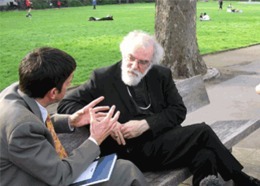Environment - Ethical Man, BBC 2 Newsnight
 Justin Rowlatt with the Archbishop
Justin Rowlatt with the Archbishop Thursday 4th May 2006
Justin Rowlatt, a reporter for BBC 2's Newsnight programme spent a year trying to live ethically. As part of his series of reports he interviewed the Archbishop on the morality of climate change and the practicalities of making a difference.JUSTIN ROWLATT:
This is Lambeth Palace, the home of the Archbishop of Canterbury, Rowan Williams. Well, Dr Williams has talked a lot about the moral obligation we all have to tackle climate change. I've been trying to do my bit as Newsnight's ethical man, so what's the Archbishop been doing? Don't see a wind turbine up there ....
Dr Williams said today that the Church of England was launching a comprehensive environmental audit of all its activities. The aim is to reduce its carbon footprint. He said we all need to ask what we can do as individuals to tackle global warming
[Archbishop in video clip..."the fundamental question is 'who are are, where do we belong, and do we belong anywhere in this world? Because we behave as if we didn't. "]
I've been trying to reduce my carbon footprint for three months now. It's not easy. To get a big reduction you need to make big changes in the way you live. Cut out flying, get rid of the car, turn off the central heating.
I met the Archbishop this afternoon....
JR: Who we are is bound up in the way in which we live; and the way in which we live is dependent on this consumer culture - is dependent on these huge amounts of carbon. It's going to be very difficult to change that.
ARCHBISHOP: It is, and part of the message is that it's possible to change some of the things to begin the process. Certainly, we're a society that assumes a high level of energy consumption is normal: we're a society that timetables itself around the possibility of rapid travel and challenging that is a long job.
JR: And making those changes is asking people to make huge personal sacrifices - huge changes in who they are and in their sense of identity?
ABC: In their sense of belonging to the environment, not just in casual guests passing through.
JR: What I'm getting at is that that is a huge demand to make on people, and how do you think you can ask that and expect them to respond?
ABC: You have somehow to appeal to peoples' motivation in terms of a future for their children and grandchildren - very simple but basic and true - you have, I think, somehow to get people to see that living in balance, living in rhythm, living in according to (well, as a religious person I would naturally say) some sort of inner harmony, is actually a recipe for being more human rather than less.
JR: But it'll also need a certain amount of coercion and force; governments need to step in and herd us all in the right direction and that's going to be a painful process... is government doing enough?
ABC: Government isn't doing a great deal in terms of coercion but that 's not surprising because on the whole electorates don't vote in governments that coerce them. So - a vicious circle really - we need to motivate change, the vision of change on the part of electorates.
JR: So would you be saying to the government that 'you need to do more'?
ABC: You can always say to governments 'you need to do more', can't you? But we need to do more ...
JR: The Church owns shares in oil companies.
ABC: ... the church owns shares in oil companies.
JR: ...have you sold those shares?
ABC: No we haven't - I think what level of investment in what is appropriate, is complicated; as the whole field of ethical investment is complicated. And we're only just waking up to some of that complexity.
JR: But the shares have proved hugely profitable.
ABC: And we've been reminded very forcibly of that. There's no quick, guilt-free solution to all of this.
JR: Well, selling them would help, though, wouldn't it?
ABC: Selling them would help; it would also create and raise a number of other ethical issues, knock-on issues, about work we do elsewhere. You don't just instantly move a vast percentage out of your income, out of your regular work, pastoral, regenerational. So not easy, I'm afraid; I wish it were.
JR: And living in a palace - is that consistent with the individual action you're saying that we should all take?
ABC: It's a good question- we're looking at the whole environmental footprint of the Palace as a whole and essentially we're talking of an office block with some flats (it's not as if I put my feet up in marbled halls every night while servants bring in the port)....
JR: Times have changed!
ABC: ...times have changed. We're looking at a working environment which is very fully occupied and within that looking at things like putting off the lights at night, what we do with our computers, cars we buy and so on.
JR: I'm looking at a wind turbine on the roof; I notice there's no wind turbine on the roof of Lambeth Palace. Is that something you'd consider?
ABC: That's something we'd consider.
© Rowan Williams 2006
